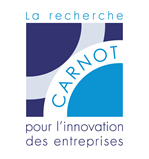Le réseau
The Carnot network
The Carnot network comprises public research structures, certified by the French Ministry in charge of Research, committed to developing research partnerships that promote innovation in businesses of all sizes – from SMEs to large corporations – and among socio-economic stakeholders.
The Carnot institutes’ intellectual property policy
The Carnot institutes network’s purpose is to develop research partnerships with companies and fostering technology transfers. This involves an organised transfer of public research results for an optimal benefit with the best possible socio-economic impact.
Carnot : choosing a name ?
Asked to improve steam engines (Reflections on the motive power of heatand on machines fitted to develop that power), Nicolas Léonard Sadi Carnot (1796-1832) established the second law of thermodynamics, which governs the workings of devices that we all use on a daily basis (heat engines in cars, refrigerators, etc.).
Board of the Association
The composition of the board of the Association of Carnot Institutes is as follows:
Association des instituts Carnot
To forge a genuine operating dynamic, unlock synergies and take full advantage of their shared commitment to partnership-based research and innovation in business, all Carnot Institutes belong to the Association of Carnot Institutes (AiCarnot) through their oversight body. AiCarnot brings together all of the Carnot Institutes and is tasked with coordinating and structuring the network.
Our mission
Carnot’s mission is to prepare the industry and economy of tomorrow by supporting businesses’ innovation and transformation strategy.
The Carnot label
Founded in 2006, the Carnot Label was designed to develop partnership-based research, meaning research conducted by public laboratories in partnership with socio-economic players, primarily industry (from SMEs to large corporations), to serve their needs.

